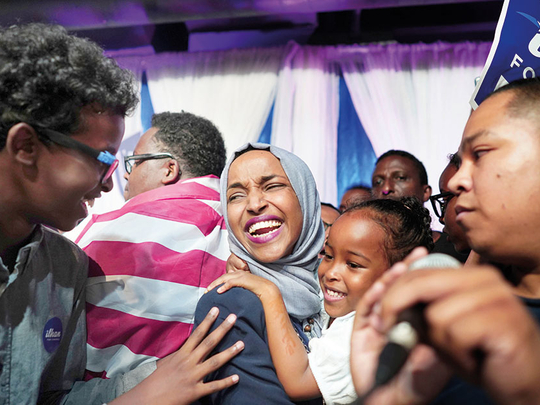
Dubai: A former refugee, a Muslim mother of three, the first Somali-American lawmaker in the US and now on the road to become the first Somali-American elected to Congress — it has been a long journey for Ilhan Omar.
The legislator from Minneapolis neared another first earlier this week by winning the Democratic primary in a congressional race, while voters set the battlefield in two other Minnesota districts that could help determine which party controls the House. In 2016, Omar drew national attention and broke into elected office in 2016 by unseating a 22-term Democratic incumbent, becoming the first Somali-American elected to a state legislature. For this week’s primary, she led a field that included former state House Speaker Margaret Anderson Kelliher. With a slight record after a single term in the minority party, Omar touted her background to voters, saying she would fight against US President Donald Trump and noting that she would have been affected by his proposal to restrict travel from Muslim-majority countries.
Omar and Rashida Tlaib — a Palestinian-American who won a Detroit-area Democratic primary in Michigan last week and is running unopposed in November — are now positioned to become the first two Muslim women to serve in Congress, with Omar being the first Somali-American elected. A record number of Muslims — at least 90 — have run for political office in the 2018 midterm elections.
“Tonight we are celebrating because we engaged and empowered our community and we won!” Omar said the night her victory was confirmed. “Our campaign staff, our volunteers, and the people of the Fifth Congressional District are the inspiration we need to get up every day and fight for a democracy that guarantees a more just and equitable society,” she said.
Keith Ellison left the seat to run for state attorney general, winning his primary on Tuesday for that job. The race was one of three in Minnesota sparked by decisions incumbent Minnesota Democrats to leave Congress.
The youngest of seven children, Omar and her family fled from the Somali civil war and spent four years in a refugee camp in Mombasa in Kenya. When she arrived at the US in 1995 at the age of 12, she spoke Somali and two English phrases: “hello” and “shut up”. They settled in Minneapolis where she learnt English by watching American TV, according to NPR. As her English improved, she began translating for her grandfather at political events in the Twin Cities. “In my last race, I talked about what my win would have meant for that eight-year-old girl in that refugee camp,” Omar told a crowd of supporters after her win. “And today, I still think about her and I think about the kind of hope and optimism all of those eight-year-olds around the country and around the world get from seeing your beautiful faces elect and believe in someone like me. So I humbly thank you. I congratulate you and I ask you, lets continue to celebrate and bring our joy and hope to the campaign trail tomorrow.”
Apart from immigration, the key agenda on Omar’s campaign has been about cancelling student debt, banning private prisons, increasing the number of refugees admitted to the US, and cutting funding for “perpetual war and military aggression.” She supports passing a national bill of rights for renters, the End Racial and Religious Profiling Act, and automatically registering every eighteen-year-old to vote. Her primary victory is expected to lead to a win in the November midterm elections and take her to Congress. She will face Republican candidate Jennifer Zeilinski at the election.
According to Omar, the reasons behind her success so far lies in the authentic representation of the voice of young people. “I think I bring the voice of women in the East African community. I bring the voice of Muslims. I bring the voice of young mothers looking for opportunities,” she told a community gathering.
A seat in Congress would be a high-water mark for the Somali community in Minnesota, who in recent years have won seats on the Minneapolis school board and City Council. First drawn in the early 1990s by generous social programmes, the state’s Somali population is now estimated by the census to number more than 50,000. Home to the biggest population of Somalis outside Somalia, Minneapolis has a neighbourhood nicknamed “Little Mogadishu”.
An ecstatic Habon Abdulle, the executive director of the Minneapolis group Women Organising Women Network, told local media soon after her 2016 victory: “Minneapolis said no to the narrative of making America hate again. Minneapolis tonight said yes to diversity … You said Muslim women have space in the governing body of our state. Thank you.”
Shortly after Omar’s victory as a lawmaker in 2016, Mohammad Giama, a 90-year-old former Somali ambassador to the European Commission who is now settled in the US, said he was overjoyed witnessing history. “I never thought a Somali lady, a refugee, can get through all this hardship and difficulties to get elected to Minnesota parliament,” Giama told local media.












